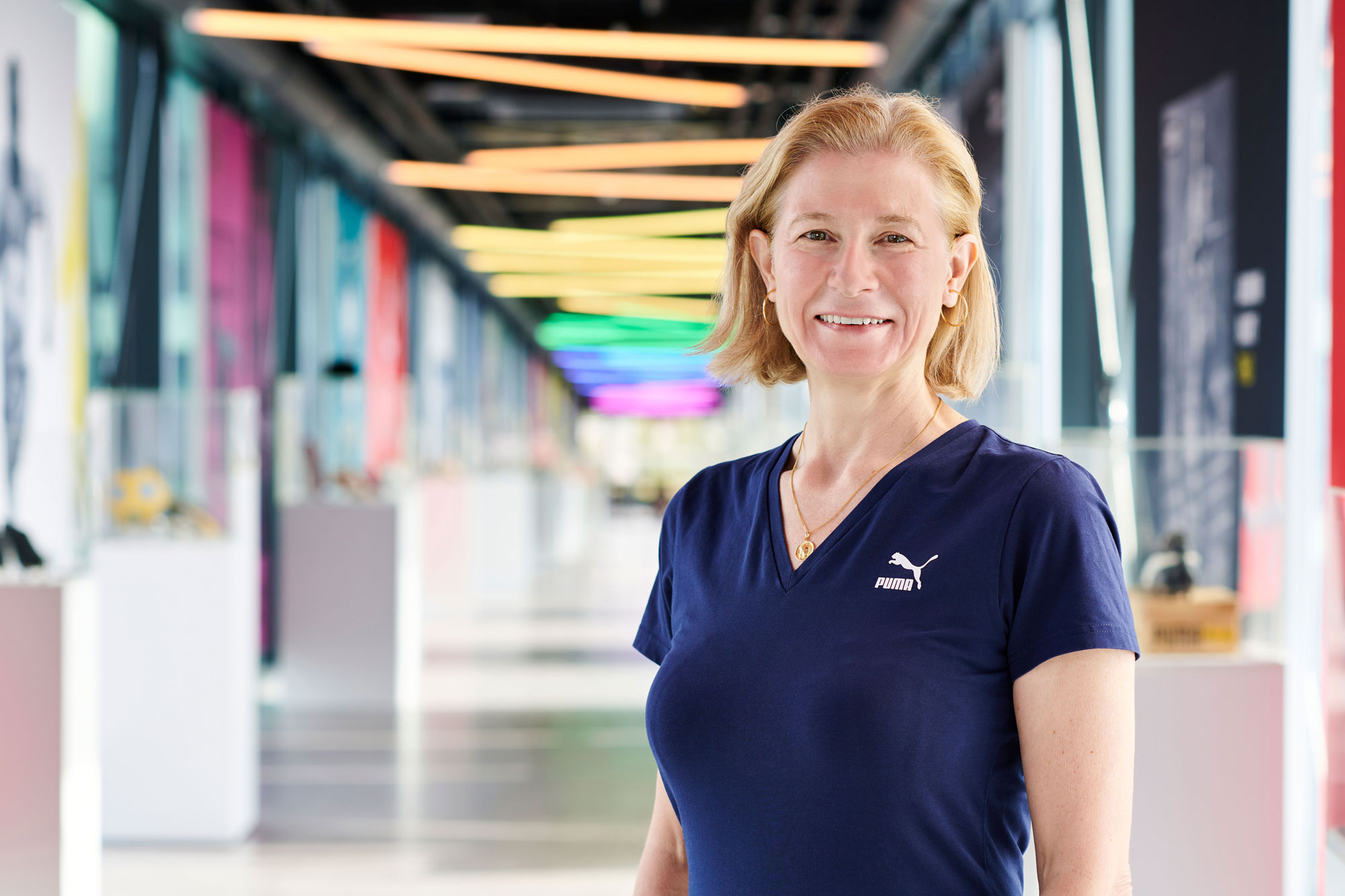
2022 allowed us to achieve several milestones in Climate Action, Circularity and Human Rights, as set in our Forever Better sustainability strategy and 10FOR25 targets:
We were able to produce 7 out of 10 products* according to our PUMA Sustainability Index, which means these products are made with more sustainable materials. In 2022, 100% of all leather, 99.8% of all cotton and 99% of all paper and carboard packaging used by PUMA were sourced in more sustainable versions such as, Leather Working Group certified leather, Better Cotton or FSC certified or recycled paper and carboard.
We also further increased our circularity efforts. Meanwhile over 50% of the polyester used for our apparel and accessories products comes from recycled materials, and we started to scale up the use of recycled cotton.
With the RE:SUEDE project, we created a biodegradable experiment of our most iconic sneaker and with RE:JERSEY, we piloted a garment-to-garment recycling process of polyester clothing, in partnership with major football clubs like Manchester City, AC Milan, Borussia Dortmund and Olympique de Marseille.
To help fight climate change, we continued to source 100% renewable electricity for PUMA’s own offices, stores and warehouses, either with renewable electricity tariffs or renewable energy attribute certificates. In addition, we invested over € 1.5 million to electrify our PUMA car fleet and saw the first ever electric truck starting operations for PUMA in the USA. This has helped us to reduce our own carbon emissions by 86% compared to our 2017 baseline. At supplier level, several factories started producing own renewable energy with large-scale rooftop solar PV installations or by transitioning boilers from fossil fuels to biomass.
On the social side, 160,000 factory workers were trained on sexual harassment at work, hitting our target three years ahead of schedule. As a long-term signatory to the Bangladesh International Accord on Building and Fire safety, we also signed the newly established Pakistan Accord and our PUMA employees contributed 43,000 hours of community engagement work around the globe.
Our engagement was recognized with top positions in several rankings and ratings last year, for example the Business of Fashion Sustainability Index, the Carbon Disclosure Project (CDP) or the Sustainability Leadership award from American Footwear News.
Despite these recognitions, we are fully aware that much remains to be done to make PUMA a truly sustainable company. For example, product-to-product recycling so far only exists at pilot scale, the wages paid in many sourcing countries still need to be increased to allow for a decent living and our goods are still transported from the manufacturing hubs to markets using fossil fuels.
We are convinced that many challenges we are facing today are systemic and need to be tackled at an industry level.
Therefore, we discussed the sustainability challenges and potential solutions with young activists, experts and industry peers, such as the CEO of Under Armor, during our first Conference of the People.
The feedback we received from Generation Z activists keeps me optimistic. We need to further strengthen our efforts and young generations not only accept that this needs to be done, but also demand their favorite brands to behave more sustainably.
There is only one Forever – Let’s Make it Better.
During 2022 we continued to implement our Forever Better Sustainability Strategy and work towards our 10FOR25 sustainability targets. In addition, we further increased communication around Forever Better and launched more sustainable products.
Meanwhile seven out of 10 PUMA products globally are aligned with our definition of a more sustainable product, meaning they are made with a significant part of more sustainable materials, such as recycled cotton or recycled polyester, for example.
In the area of Circularity, we launched product takeback initiatives at selected stores of our major football club partners. At PUMA, we now operate takeback bins at our Headquarters Store in Germany as well as stores in the US, China/Hong Kong and Australia.
In terms of Climate Action, we continued to power our own offices, stores and warehouses with 100% green electricity and added 93 electric cars to our PUMA car fleet. We introduced the first ever electric truck at our logistics center in the US and agreed with our global logistics service provider, Maersk, to start using biofuels for the shipping of PUMA products. Our core suppliers increased their share of renewable energy to 11%.
In the area of Human Rights, the average payment is 13.4% above minimum wages for our core supplier Tier 1 factories. Our PUMA employees donated 43,000 working hours to community engagement work and we continued to send signals for diversity and inclusion, for example by increasing the percentage of women on our management board to 50% and by moving to genderless restrooms at our Headquarters.
We agreed to partner with the Fashion Pact and Textile Exchange on Biodiversity. To ensure for example, the leather used for PUMA products does not contribute in any way to deforestation, we monitor the traceability ratings of our tanneries. In the meantime, all the tanneries are certified by the Leather Working Group. For paper and carboard 99% are either FSC certified and/or recycled, also to avoid any linkages to deforestation.
*Excluding products produced by PUMA Group company stichd. For further details on the reporting scope, please refer to Scope of the Report section.